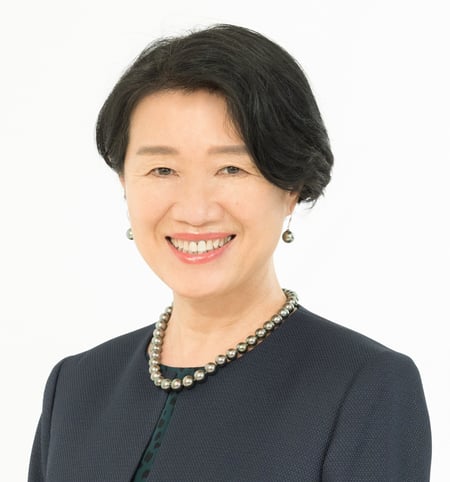A new leaf is turned over with the resolution passed for changing the name of the Hong Kong Institute of Chartered Secretaries 香港特許秘書公會(“HKICS”) to Hong Kong Chartered Governance Institute 香港公司治理公會(“HKCGI”) in a hybrid General Meeting of the Institute held on 15 July, 2021. To learn more about the evolution and its deeper meaning behind, we talk to Ellie Pang, Chief Executive of HKCGI.

Ellie Pang, Chief Executive of HKCGI
According to Ellie, the new name is perfectly justified for the evolving roles of Chartered Governance Professionals (“CGP”) and Chartered Secretary (“CS”), which are the dual designations awarded to all HKCGI members since 2018. As the range of technical expertise and breadth of professional backgrounds that the Institute’s membership represents has widened significantly beyond pure company secretarial practice, the new name is clearly a better reflection of the roles and function of the profession.
Let’s flip through the history of HKICS which dates back to 1949 when it was first established as an association of Hong Kong members of the Institute of Chartered Secretaries and Administrators (“ICSA”) in London. The ICSA itself was also renamed as The Chartered Governance Institute (“CGI”) in September 2019 in alignment with its broadening roles.
Company Secretary Not just an Administrative Role
Despite international developments and the award of dual designations to all members, it is still an undeniable fact that not everybody realises what the profession means and the duties of a company secretary. “Even today people are still confused with and can’t tell the difference between company secretaries vs. secretaries and administrators”, Ellie points out. The misperception widely exists and little has changed over the years.
Company Secretary as Senior Management in its New Normal
Should the misperception have something to do with the word “company secretary”? If so, the new name of the Institute and the dual designations may go some way to change that. A company secretary is not only a supportive administrator, but “a member of the senior management” as defined by the Listing Rule 2A.09(2)(c) of The Hong Kong Exchanges and Clearing Limited (“HKEX”). This is a new Rule that came into effect on July 3, 2021.
Apart from that, it is black and white in Section F of the Corporate Governance Code (“CGC”) that “The company secretary is responsible for advising the board through the chairman and/or the chief executive on governance matters and should also facilitate induction and professional development of directors.”
And that, “All directors should have access to the advice and services of the company secretary to ensure that board procedures, and all applicable law, rules and regulations, are followed. “
More Than a Legal Requirement
Why does every listed company need to have a company secretary? Think about that. A company secretary has long supported the board of directors with a wealth of knowledge regarding all facets of corporate governance. As it is clear from the Listing Rules cited above, regulators also expect company secretaries to advise the board on governance matters. A CGP/CS attends all the board meetings and shareholders’ meetings. Should any issues arise, they are the first go-to person for the board. It is more than a legal or regulatory requirement to have a company secretary in each company, as whose expertise in governance and broad experience are of pivotal importance to the company.
The HKCGI is now the only qualifier of the internationally recognised CGP/CS qualifications for governance professionals in Hong Kong and Mainland China.
Regarding the background of CGP/CS, Ellie explains “they come from two mainstreams, usually legal and accounting fields”. Ellie herself is a qualified solicitor. First trained up as a litigation lawyer, she joined the HKEX as an enforcement lawyer. “My initial role at the Exchange was to enforce breaches of the Listing Rules at the HKEX. I then moved to the Policy team, responsible for many of the major rule changes in the areas of corporate governance and environmental, social and governance”.
Talent Development for Global Trend
To cultivate and nurture talent for the career market is one of the Institute’s top priority. “It’s our daily job to explain to our members how to become a trusted governance professional, through continuous professional development training that the Institute regularly provides, members and students can keep abreast with the current laws, regulations and listing rules that are relevant to their daily work,” says Ellie.
HKCGI has approximately 10,000 members as of 2021, among which there are over 6,600 full members, 300 graduates and 3,000 plus student members. “Students don’t mean fresh graduates,” explains Ellie, “but they are often qualified lawyers and accountants, amongst others, who are studying to become members.”
“One-size-fits-all” approach does not apply to all, but some targeted opinions from Ellie may be worth listening to.
- A word for the post-90s.
“It’s not unusual for fresh graduates to feel a bit lost or lacking in career direction,” says Ellie. “My advice is to expand and keep up-to-date with your knowledge and skill sets so that you are able to jump at it when an opportunity comes your way.”
- Legal and accounting professionals with five years or more post-qualifying experience.
“A five-year experience plus two papers at HKCGI are good to go, but the work experience needs to be relevant”, notes Ellie. Take for instance, “A five-year experience as a company lawyer would be more relevant than conveyancing lawyer focused only on sale and purchase of properties, and a litigation lawyer focused only on particular types of work.”
- Seasoned governance professionals.
While post-qualifying experiences of a CGP/CS varies, dual qualifications of CG/CGP are internationally recognised and highly portable. The Institute members have great responsibilities and are making significant contributions to safeguard high governance standards within their organisations.
Industry Efforts to Promote Corporate Governance
HKCGI has a role to enhance members’ status and standing in the society, and to make sure they meet the expectations of companies and regulators such as HKEX. Ellie is glad that members are appreciative of the training programs and activities organised by the Institute. For instance, the Institute’s 22nd Annual Corporate Regulatory Update 2021 (ACRU 2021), a one-day annual event, attracted a record 2,080 participants.
HKCGI now runs two examinations of eight modules and more than 90 seminars a year, in an effort to sustain and strengthen members’ competencies and professional standing into the 21st century. A 15-hour study annually is also required to keep them refreshed of what is happening in the market.
In the face of diverse governance challenges like risk management, climate change, conflicts of interest, corruption, ethical issues, and a long list to go, a CGP/CS has to be well-equipped and up-to-date with the regulatory developments in order to advise the board and communicate with stakeholders.
Governance means everything to a corporate. A quote from one of the members of HKCGI draws a strong conclusion here.
“Corporate Governance makes companies more accountable and transparent to investors and gives them the tools to respond to legitimate stakeholder concerns.”
- Terry Ip FCG FCS, Director, Investor Services, Tricor Group







